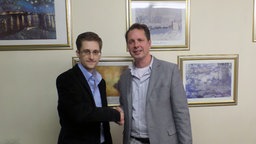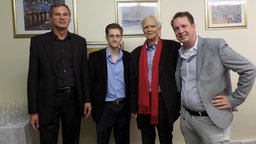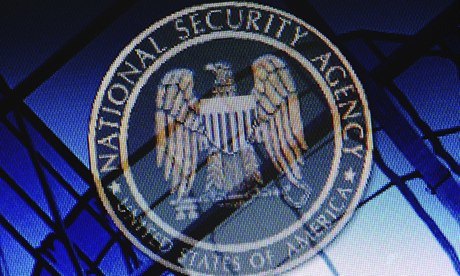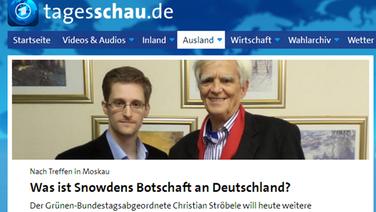Edward Snowden Letter to German Government in Full :
Full text of NSA whistleblower's letter on US surveillance to chancellor Angela Merkel, the German parliament and federal prosecutors, passed on by German politician Hans-Christian Ströebele
 o whom it may concern,
o whom it may concern,
I have been invited to write to you regarding your investigation of mass surveillance.
I am Edward Joseph Snowden, formerly employed through
contracts or direct hire as a technical expert for the United States
National Security Agency, Central Intelligence Agency, and Defense
Intelligence Agency.
In the course of my service to these organizations, I
believe I witnessed systemic violations of law by my government that
created a moral duty to act. As a result of reporting these concerns, I
have face a severe and sustained campaign of persecution that forced me
from my family and home. I am currently living in exile under a grant of
temporary asylum in the Russian Federation in accordance with
international law.
I am heartened by the response to my act of political
expression, in both the United States and beyond. Citizens around the
world as well as high officials – including in the United States – have
judged the revelation of an unaccountable system of pervasive
surveillance to be a public service. These spying revelations have
resulted in the proposal of many new laws and policies to address
formerly concealed abuses of the public trust. The benefits to society
of this growing knowledge are becoming increasingly clear at the same
time claimed risks are being shown to have been mitigated.
Though the outcome of my efforts has been demonstrably
positive, my government continues to treat dissent as defection, and
seeks to criminalize political speech with felony charges that provide
no defense. However, speaking the truth is not a crime. I am confident
that with the support of the international community, the government of
the United States will abandon this harmful behavior. I hope that when
the difficulties of this humanitarian situation have been resolved, I
will be able to cooperate in the responsible finding of fact regarding
reports in the media, particularly in regard to the truth and
authenticity of documents, as appropriate and in accordance with the
law.
I look forward to speaking with you in your country
when the situation is resolved, and thank you for your efforts in
upholding the international laws that protect us all.
With my best regards,
Edward Snowden
31 October 2013
MW LOGS, 31-10-2013 at Czech Republic :
( All times in CET! )
- STUDIO 69, 1656kcs, 22.49hrs, SINPO 44344
( Pop oldy "You never walk alone", then country music )
- RADIO VERONICA, 1640kcs, 22.52hrs, SINPO 44444
( ID and giving telephone number in Dutch, then Dutch music )
- ZENDER METEOR, 1611kcs, 22.55hrs, SINPO 4-5,3444
( Polka music )
- UNID ON 1645kcs, 22.58hrs, SINPO 32442
( Polka music )
- UNID ON 1665kcs, 23.00hrs, SINPO 24332
( Dutch music )
- UNID ON 1649kcs, 23.02hrs, SINPO 3233,2-3
( Dutch music )
- UNID SERBIAN/GREEK, 1690kcs, 23.04hrs, SINPO 4-3,433,4-3
( Pop music mix, e.g. "Wind of change" )
- UNID GREEK, 1653kcs, 23.06hrs, SINPO 4433,4-3
( Greek music )
- UNIID GREEK, 1625kcs, 23.08hrs, SINPO 4344,4-3
( Greek music )
- UNID GREEK ON 1619kcs, 23.12hrs, SINPO 44434
( Greek music )
- RADIO NOORDZEE, 1645kcs, 23.36hrs, SINPO 4343,4-3
( Instrumental music, then ID in Dutch )
- UNID ON 1629kcs, 23.44hrs, SINPO 4343,3-4
( Instrumental music )
RX: Roadstar TRA
Antenna: Inverted Vee antenna, 48mtrs
Whistleblower Snowden: "Ich bereue nichts"
Presseerklärung der ARD-"Panorama"-Redaktion und der Süddeutschen Zeitung

Edward Snowden (li.) und John Goetz in Moskau.
Bei dem im ARD-Magazin "Panorama" am
Donnerstag, 31. Oktober, gezeigten Treffen des NSA-Enthüllers Edward
Snowden mit NDR Reporter John Goetz ("Panorama" und "Süddeutsche
Zeitung") wurde das folgende Interview geführt:
Bereuen Sie die Enthüllungen?
Edward Snowden: "Als Konsequenz davon, das Richtige gemacht zu haben: Ich bereue nichts."
("The consequence of doing the right thing is that I have no regrets.")
("The consequence of doing the right thing is that I have no regrets.")
Welche Nachteile schmerzen Sie am meisten?
"Der Preis meiner Handlung ist der Verlust von echten und regelmäßigen Kontakten zu meiner Familie und meinen Freunden."
("The cost of my action has been the loss of real and regular contact with my family and loved ones.")
("The cost of my action has been the loss of real and regular contact with my family and loved ones.")
Links
Warum geben Sie keine Interviews zum Inhalt der NSA-Dokumente?
"Unabhängige Journalisten und Experten sollen sich ihr eigenes Urteil darüber bilden, was die Dokumente beinhalten."
("Independent journalists and experts should make their own judgments about what the documents show.")
("Independent journalists and experts should make their own judgments about what the documents show.")
Wie sehen Sie Ihre Verdienste?
Snowden: "Ich habe das Ganze in
Gang gebracht, aber Journalisten, Politiker, technische Experten und
normale Bürger bestimmen am Ende, in welchem Ausmaß wir davon
profitieren."
("I may have started this, but it is journalists, politicians, technical experts and ordinary citizens who will decide how much we benefit from this.")
("I may have started this, but it is journalists, politicians, technical experts and ordinary citizens who will decide how much we benefit from this.")
Videos
Was sagen Sie zum Vorwurf, der US-Regierung zu schaden?

Von links nach rechts: Georg Mascolo, Edward Snowden, Christian Ströbele und John Goetz.
Snowden: "Was der Öffentlichkeit in den USA und in anderen Ländern hilft, das hilft auch der Regierung der Vereinigten Staaten."
("What helps the US public and the public in other countries also helps the government of the United States.")
("What helps the US public and the public in other countries also helps the government of the United States.")
Warum werden Sie dann strafrechtlich verfolgt?
Snowden: "Die US-Regierung möchte ein Exempel statuieren: Wenn Du die Wahrheit sagst, zerstören wir Dich."
("The US government wants to set an example: if you [tell the truth], we will destroy you.")
("The US government wants to set an example: if you [tell the truth], we will destroy you.")
Warum haben Sie nicht auf interne Kontrollmechanismen in der NSA vertraut?
Snowden: "Vor dem Hintergrund der
aktuellen Berichte über NSA-Spionage als Ergebnis der Präsidenten-Order
12333 (ohne besondere Mitteilung an alle Mitglieder der
Geheimdienst-Ausschüsse) ist es klar, dass die NSA Kontrolle verhindert.
Es ist umso wichtiger, dass ein parlamentarischer
Untersuchungsausschuss wie damals das 'Church Committee' herausfindet,
was in unserem Namen gemacht wird."
("In light of the recent stories about NSA espionage resulting from presidential order 12333 [without being specifically briefed to all members of the intelligence committees], it is clear that the NSA is avoiding oversight. It is even more important that a congressional investigation like the Church Committee finally looks into what is being done in our name.")
("In light of the recent stories about NSA espionage resulting from presidential order 12333 [without being specifically briefed to all members of the intelligence committees], it is clear that the NSA is avoiding oversight. It is even more important that a congressional investigation like the Church Committee finally looks into what is being done in our name.")
NSA surveillance may cause breakup of internet, warn experts
Internet specialists highlight moves by Brazil, Germany and India towards creating separate networks in order to block spying

NSA spying, as
revealed by the whistleblower Edward Snowden, may cause countries to
create separate networks and break up the experts, according to experts.
Photograph: Alex Milan Tracy/NurPhoto/NurPhoto/Corbis
The vast scale of online surveillance revealed by Edward Snowden is leading to the breakup of the internet
as countries scramble to protect private or commercially sensitive
emails and phone records from UK and US security services, according to
experts and academics.
They say moves by countries, such as Brazil and Germany, to encourage regional online traffic to be routed locally rather than through the US are likely to be the first steps in a fundamental shift in the way the internet works. The change could potentially hinder economic growth.
"States may have few other options than to follow in Brazil's path," said Ian Brown, from the Oxford Internet Institute. "This would be expensive, and likely to reduce the rapid rate of innovation that has driven the development of the internet to date … But if states cannot trust that their citizens' personal data – as well as sensitive commercial and government information – will not otherwise be swept up in giant surveillance operations, this may be a price they are willing to pay."
Since the Guardian's revelations about the scale of state surveillance, Brazil's government has published ambitious plans to promote Brazilian networking technology, encourage regional internet traffic to be routed locally, and is moving to set up a secure national email service.
In India, it has been reported that government employees are being advised not to use Gmail and last month, Indian diplomatic staff in London were told to use typewriters rather than computers when writing up sensitive documents.
In Germany, privacy commissioners have called for a review of whether Europe's internet traffic can be kept within the EU – and by implication out of the reach of British and US spies.
Surveillance dominated last week's Internet Governance Forum 2013, held in Bali. The forum is a UN body that brings together more than 1,000 representatives of governments and leading experts from 111 countries to discuss the "sustainability, robustness, security, stability and development of the internet".
Debates on child protection, education and infrastructure were overshadowed by widespread concerns from delegates who said the public's trust in the internet was being undermined by reports of US and British government surveillance.
Lynn St Amour, the Internet Society's chief executive, condemned government surveillance as "interfering with the privacy of citizens".
Johan Hallenborg, Sweden's foreign ministry representative, proposed that countries introduce a new constitutional framework to protect digital privacy, human rights and to reinforce the rule of law.
Meanwhile, the Internet Corporation for Assigned Names and Numbers – which is partly responsible for the infrastructure of the internet – last week voiced "strong concern over the undermining of the trust and confidence of internet users globally due to recent revelations of pervasive monitoring and surveillance".
Castro said that as the scale of the UK and US surveillance operations became apparent, countries around the globe were considering laws that would attempt to keep data in-country, threatening the cloud system – where data stored by US internet firms is accessible from anywhere in the world.
He said this would have huge implications for the way large companies operated.
"What this would mean is that any multinational company suddenly has lots of extra costs. The benefits of cloud computing that have given us flexibility, scaleability and reduced costs – especially for large amounts of data – would suddenly disappear."
Large internet-based firms, such as Facebook and Yahoo, have already raised concerns about the impact of the NSA revelations on their ability to operate around the world. "The government response was, 'Oh don't worry, we're not spying on any Americans'," said Facebook founder Mark Zuckerberg. "Oh, wonderful: that's really helpful to companies trying to serve people around the world, and that's really going to inspire confidence in American internet companies."
Castro wrote a report for Itif in August predicting as much as $35bn could be lost from the US cloud computing market by 2016 if foreign clients pull out their businesses. And he said the full economic impact of the potential breakup of the internet was only just beginning to be recognised by the global business community.
"This is changing how companies are thinking about data. It used to be that the US government was the leader in helping make the world more secure but the trust in that leadership has certainly taken a hit … This is hugely problematic for the general trust in the internet and e-commerce and digital transactions."
Brown said that although a localised internet would be unlikely to prevent people in one country accessing information in another area, it may not be as quick and would probably trigger an automatic message telling the user that they were entering a section of the internet that was subject to surveillance by US or UK intelligence.
"They might see warnings when information is about to be sent to servers vulnerable to the exercise of US legal powers – as some of the Made in Germany email services that have sprung up over the summer are."
He said despite the impact on communications and economic development, a localised internet might be the only way to protect privacy even if, as some argue, a set of new international privacy laws could be agreed.
"How could such rules be verified and enforced? Unlike nuclear tests, internet surveillance cannot be detected halfway around the world."
They say moves by countries, such as Brazil and Germany, to encourage regional online traffic to be routed locally rather than through the US are likely to be the first steps in a fundamental shift in the way the internet works. The change could potentially hinder economic growth.
"States may have few other options than to follow in Brazil's path," said Ian Brown, from the Oxford Internet Institute. "This would be expensive, and likely to reduce the rapid rate of innovation that has driven the development of the internet to date … But if states cannot trust that their citizens' personal data – as well as sensitive commercial and government information – will not otherwise be swept up in giant surveillance operations, this may be a price they are willing to pay."
Since the Guardian's revelations about the scale of state surveillance, Brazil's government has published ambitious plans to promote Brazilian networking technology, encourage regional internet traffic to be routed locally, and is moving to set up a secure national email service.
In India, it has been reported that government employees are being advised not to use Gmail and last month, Indian diplomatic staff in London were told to use typewriters rather than computers when writing up sensitive documents.
In Germany, privacy commissioners have called for a review of whether Europe's internet traffic can be kept within the EU – and by implication out of the reach of British and US spies.
Surveillance dominated last week's Internet Governance Forum 2013, held in Bali. The forum is a UN body that brings together more than 1,000 representatives of governments and leading experts from 111 countries to discuss the "sustainability, robustness, security, stability and development of the internet".
Debates on child protection, education and infrastructure were overshadowed by widespread concerns from delegates who said the public's trust in the internet was being undermined by reports of US and British government surveillance.
Lynn St Amour, the Internet Society's chief executive, condemned government surveillance as "interfering with the privacy of citizens".
Johan Hallenborg, Sweden's foreign ministry representative, proposed that countries introduce a new constitutional framework to protect digital privacy, human rights and to reinforce the rule of law.
Meanwhile, the Internet Corporation for Assigned Names and Numbers – which is partly responsible for the infrastructure of the internet – last week voiced "strong concern over the undermining of the trust and confidence of internet users globally due to recent revelations of pervasive monitoring and surveillance".
Daniel
Castro, a senior analyst at the Information Technology & Innovation
Foundation in Washington, said the Snowden revelations were pushing the
internet towards a tipping point with huge ramifications for the way
online communications worked.
"We are certainly getting pushed
towards this cliff and it is a cliff we do not want to go over because
if we go over it, I don't see how we stop. It is like a run on the bank –
the system we have now works unless everyone decides it doesn't work
then the whole thing collapses."Castro said that as the scale of the UK and US surveillance operations became apparent, countries around the globe were considering laws that would attempt to keep data in-country, threatening the cloud system – where data stored by US internet firms is accessible from anywhere in the world.
He said this would have huge implications for the way large companies operated.
"What this would mean is that any multinational company suddenly has lots of extra costs. The benefits of cloud computing that have given us flexibility, scaleability and reduced costs – especially for large amounts of data – would suddenly disappear."
Large internet-based firms, such as Facebook and Yahoo, have already raised concerns about the impact of the NSA revelations on their ability to operate around the world. "The government response was, 'Oh don't worry, we're not spying on any Americans'," said Facebook founder Mark Zuckerberg. "Oh, wonderful: that's really helpful to companies trying to serve people around the world, and that's really going to inspire confidence in American internet companies."
Castro wrote a report for Itif in August predicting as much as $35bn could be lost from the US cloud computing market by 2016 if foreign clients pull out their businesses. And he said the full economic impact of the potential breakup of the internet was only just beginning to be recognised by the global business community.
"This is changing how companies are thinking about data. It used to be that the US government was the leader in helping make the world more secure but the trust in that leadership has certainly taken a hit … This is hugely problematic for the general trust in the internet and e-commerce and digital transactions."
Brown said that although a localised internet would be unlikely to prevent people in one country accessing information in another area, it may not be as quick and would probably trigger an automatic message telling the user that they were entering a section of the internet that was subject to surveillance by US or UK intelligence.
"They might see warnings when information is about to be sent to servers vulnerable to the exercise of US legal powers – as some of the Made in Germany email services that have sprung up over the summer are."
He said despite the impact on communications and economic development, a localised internet might be the only way to protect privacy even if, as some argue, a set of new international privacy laws could be agreed.
"How could such rules be verified and enforced? Unlike nuclear tests, internet surveillance cannot be detected halfway around the world."



No comments:
Post a Comment